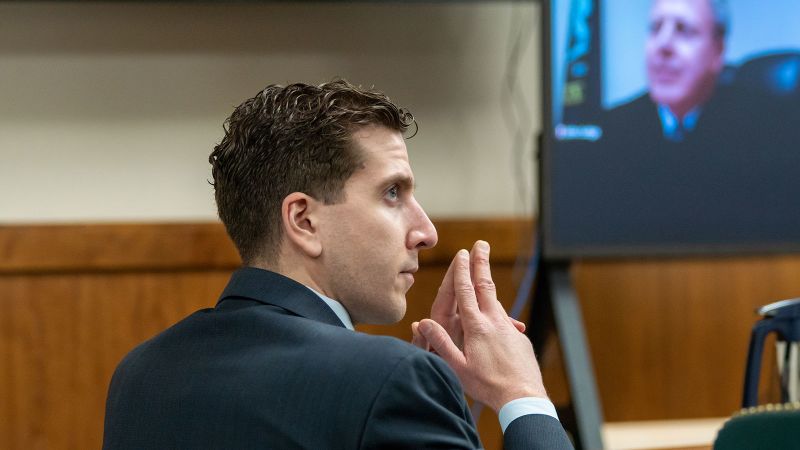The grieving family of 21-year-old Kaylee Goncalves had to wait over a month beforea suspectin her 2022 killing was arrested. Since then, they and the families of three other University of Idaho students killed at the same time have been forced to endure an agonizingly slow legal process, punctuated by delay after delay.
Now, a month before the suspect’s murder trial was finally set to begin, the families’ long wait for justice is poised to end in what one Goncalves family member calls a “shocking and cruel” plea deal – that removes the possibility of the death penalty.
“After more than two years, this is how it concludes — with a secretive deal and a hurried effort to close the case without any input from the victims’ families on the plea’s details,” the Goncalves family said in a statement shared with CNN.
The plea deal would bring an abrupt end to a case that has captured national attention since the four brutal killings rocked the small college town of Moscow, Idaho, more than two and a half years ago.
Bryan Kohberger, a 30-year-old former PhD student of criminology at Washington State University, wascharged in January 2023with fatally stabbing Goncalves, 20-year-old Ethan Chapin, 20-year-old Xana Kernodle and 21-year-old Madison Mogen in their off-campus home in the early hours of November 13, 2022.
Under the deal, Kohberger will plead guilty to four counts of murder in exchange for the government dropping the death penalty, a person familiar with the matter told CNN. Shanon Gray, an attorney for the Goncalves family, also confirmed the deal to CNN.
CNN reached out to the families of Chapin, Kernodle and Mogen about the reported plea deal.
A hearing in the case is scheduled for Wednesday. Jury selection in Kohberger’s murder trial was scheduled to begin on August 4. Prosecutors previously indicated they would pursue thedeath penalty.
The Goncalves family said they “weren’t even called about the plea” and merely “received an email with a letter attached.”
The letter, from Moscow Prosecuting Attorney Bill Thompson, indicates that Kohberger will likely be sentenced to life in prison if he pleads guilty, and that the deal requires him to waive his right to appeal, theIdaho Statesman reported.
But the Goncalves family blasted prosecutors’ “very unexpected” decision in a short social media post, writing, “We are beyond furious at the State of Idaho. They have failed us.”
Thompson told CNN his office could not comment on news of the plea deal because ofthe wide-ranging gag orderin the case. He defended the deal in the letter to the Goncalves family as “our sincere attempt to seek justice for your family,” arguing it will ensure Kohberger “will spend the rest of his life in prison,” according to the Idaho Statesman.
In a lengthier statement posted by the Goncalves family, Kaylee’s 18-year-old sister Aubrie took issue with the suddenness of the deal after a painfully long legal process, calling it “both shocking and cruel” to bring it to the families “just weeks before the scheduled trial.”
“Had this proposal come a year and a half ago, the families could have had time to process, discuss, and potentially come to terms with the idea of a life sentence – however difficult that may be,” the statement said.
Goncalves’ sister said her family is “not asking for vengeance” but casts the possibility of life in prison as an unfair outcome.
“Bryan Kohberger facing a life in prison means he would still get to speak, form relationships, and engage with the world. Meanwhile, our loved ones have been silenced forever,” she wrote.
The possibility of the death penalty has loomed large over the yearslong proceedings, with Kohberger’s defense team repeatedly arguing for it to be taken off the table.
The victims’ families have endured a sprawling legal case – which began with a lengthy wait for a suspect in their loved ones’ killings to even be identified.
For weeks, law enforcement searched for a suspect, releasing few details about their investigation. It wasn’t until December 30, 2022 – more than a month after the November 13 killings – that Kohberger was arrested in his home state of Pennsylvania.
Prosecutors said Kohberger’s arrest was largely based on DNA evidence, including a sample found on a knife sheath near one of the victims’ beds and DNA retrieved from trash outside the Kohberger family home.
The arrest was only the start of what would become a protracted legal battle. Over the past two years, Kohberger’s case has been marked by one delay after another.
One of the starkest early moments came during the arraignment in May 2023, asKohberger kept silentwhen the judge asked for his plea on the murder and burglary charges outlined in the indictment against him.
Kohberger’s attorney rose and said, “Your honor, we arestanding silent,” and the judge then entered not guilty pleas for him.
As the case proceeded, the defense team challenged the prosecution’s case, filing motions to suppress DNA evidence obtained through the forensic genealogy process and questioning the validity of other evidence, including cell phone records and the accuracy of the search warrant affidavit.
Kohberger’s trial was pushed back multiple times amid disputes over evidence and witnesses. Last September, the trial’s venue was moved from Latah County, where the crime took place, to the state capital of Boise.
Last year, the Goncalves family expressed their frustration at the repeated delays, saying the case had turned into a “hamster wheel of motions, hearings, and delayed decisions.”
Recent rulings narrowed Kohberger’s legal defense options heading into trial.
Last week, the judge rejected the defense’s attempt to present an “alternate perpetrator” theory. Kohberger’s lawyers had planned to argue that one of four other people committed the murders, but the judge ruled there was no evidence beyond “pure speculation” to support the claim.
Earlier, the judge also barred the defense from submitting an official alibi, as no one could confirm Kohberger’s whereabouts at the time of the killings.
